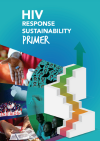Publications - Released in 2024
Achieving the 2025 and 2030 goals will require strong political leadership and the active engagement of people living with HIV and key and vulnerable populations across multiple sectors. Resources will need to be mobilized from both domestic and international sources. Sustainability will require different measures and approaches in diverse settings, highlighting the importance of tailoring sustainability planning and implementation for specific contexts, with existing efforts being leveraged. Flexibility and resilience will be essential in the face of changes in national HIV epidemics as well as in economic, political and social contexts.
This Primer document outlines a new approach to planning and implementing sustainable national HIV responses, that aims to galvanize efforts and to drive sustainable HIV Response transformations to reach and maintain epidemic control beyond 2030, by upholding the right to health for all. Through country driven and owned processes based on the most recent data, countries will develop specific HIV Response Sustainability Roadmaps. These Roadmaps will identify high-level outcomes across key domains of sustainability, including political leadership, quality access to services, system capacities, enabling policies, and domestic and international financing.
Downloads
Organizations
- Joint United Nations Programme on HIV/AIDS (UNAIDS)






